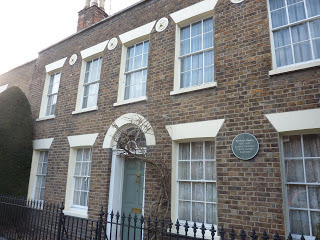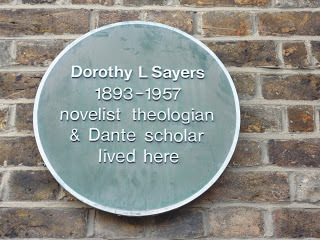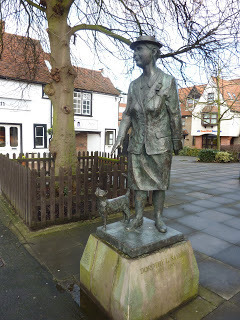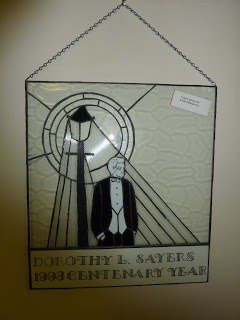Martin Edwards's Blog, page 248
March 14, 2012
Dorothy L. Sayers and Witham




It is "all go" at the moment, but I'd like to reflect on a truly enjoyable visit to Essex, a county I hardly know at all. I was invited to give the Dorothy L. Sayers annual lecture by the Dorothy L. Sayers Society at the library in Witham, the town where she lived. This was a real honour, and a marvellous occasion.
Witham struck me as a pleasant place, and the library is impressive. Standing opposite is a statue of Sayers, and inside the Society has a splendid research facility, which I explored happily for as long as I could. An excellent preamble to the lecture was a buffet at Seona Ford' delightful home in the town (I say in the town, but really it's in a delightful oasis of greenery). Among the Society's members who were present were Carolyn Caughey, a very good editor at Hodder, and the crime writer and critic Mike Ripley.
The topic of my lecture was "Dorothy L. Sayers and True Crime", a subject which was fascnating to research. I feel there is plenty of evidence that Sayers could have carved a distinct reputation as a true crime writer, had she wished to. Her interest in the famous Wallace case is just one example, while her novels illustrate, if sometimes only indirectly, how intrigued she was by real life cases.
The hospitality that I received both from the Society and Jane Wheeler and her team at the Library was terrific, and I was left with the overwhelming feeling that interest in Sayers is growing. There's no doubt the Society is thriving, and Seona organised everything brilliantly, although I was sorry that illness prevented Christopher Dean, the chairman, with whom I've often corresponded, from attending.
Such was the feelgood factor engendered by the evening that a few days later, I was tempted to buy the Folio Society edition of five of the Wimsey novels, and duly succumbed. A very attractive set to look at, though of course it is what lies between the covers that matters most of all. If only Sayers had continued to write crime in the last 20 years of her life!
March 12, 2012
Rogue's Gallery
In these stories, Bob pokes fun at some of his favourite targets – Tory politicians, members of the Royal Family (with special reference here to the marriage of Charles and Diana) and religion. "Sins of Scarlet", a story set in the Vatican, won the CWA Short Story Dagger in 2006, a source of particular pleasure to me, as it had originally featured in a CWA anthology that I edited.
A couple of the other stories here also featured in CWA collections, although Bob's most recent story, "Just Popped In", which appears in Guilty Consciences, was not available. One of the most interesting stories, "The New Slavery", deals with an important yet under-discussed topic – the way grandparents may be exploited as no-cost child-minders by their own children. It's clear from the story what Bob's own views are.
I'm a long-time admirer of Bob Barnard's work, and a few weeks ago I had the pleasure of visiting him, and his wife Louise, at their home in Armley, Leeds. One of the outcomes will be an article about his career for the US magazine "Mystery Scene". He's one of the wittiest of writers, and if you are a Christie fan, I can also recommend his excellent study of the Queen of Crime, A Talent to Deceive.
March 9, 2012
Forgotten Book - Some Must Watch
Some Must Watch is one of her most famous stories, and again it was turned into a popular film, Robert Siodmak's The Spiral Staircase. The book first came out in 1933, and it has now been republished by Arcturus Crime Classics. In fact, it's due out next week - along with titles by Erle Stanley Gardner, Anthony Berkeely, and others - including me. I'm flattered and thrilled to find All the Lonely People in such company.
I enjoyed the story, even though it's really a tale of suspense, rather than actual detection. The pert and likeable Helen, is recruited as a "lady-help" to a strange family who live on the Welsh borders. Unfortunately, a deranged serial killer is on the loose, and his first four victims have all been single young working women. Will Helen be next?
White does a very good job at building the tension. Inevitably, the story-line is dated, and some of the plot elements and characters (the invalid who may not be an invalid, the sinister nurse, the weird professor, the vampish woman) became over-used in the Golden Age and may thus be seen as cliched. But White writes with a great deal of skill, in my opinion, and she also comes up with a unique and extraordinary murder motive into the bargain. A marvellous period piece.
March 7, 2012
A Velvet Scream - review
One of the strengths of Cilla's books is that they have a distinctive sense of place – her territory is the Shropshire/Staffordshire border, where she has lived for many years. It's not a famous or even unusually dramatic part of the country, although Ellis Peters set her Cadfael stories not far away, but it's certainly attractive and interesting area, and this book evokes the local scene well.
A teenage girl is found in a bad way in the snow outside a nightclub in Leek. It seems a rapist is at work in the quiet town. Joanna is called in, but the girl's story appears to have a number of holes. A comparable case that occurred six months earlier comes to light, serving to complicate the picture. The solution to the mystery makes good use of the author's medical knowledge – she continues to work as a part-time nurse.
In some ways, Cilla Masters' novels remind me of many that appeared under that long-established and highly successful imprint, Collins Crime Club. They are short, snappy and full of believable characters - not just Joanna, but the supporting cast as well. So many bestsellers today are twice as long – but that doesn't mean they are twice as good. Life is short, and I have to say that a book like this one, that I can read reasonably quickly, has a lot to commend it. But it's not just a question of length and concision. A Velvet Scream is not just a good title, it is a good book.
March 5, 2012
When a Reviewer "Gets" a Book
Of course, there is always a risk that reviews will be written in bad faith (which is very rare, but does happen) or without a good deal of thought (more common.) But if one writes a book, or a song, or paints a picture, and allows the end product to be made available to the public, one has to accept that not everyone will care for it. Bad reviews can be very hurtful, but there is no escaping them. And the more successful a creative artist is, the more frequent bad reviews are - a paradox, but true, I think.
On the other hand, a good review is heartwarming, and may help a great deal with motivation. Sometimes, writers and other creative artists need a boost to keep them going, and a positive critical reaction can help. So, when I am writing a review, I do my best to maintain a balanced approach, and try to understand what the author was trying to achieve. Sometimes, of course, it's not entirely easy to figure out the answer!
I've also found occasionally, after taking a second look at a book or a film, that my original and immediate reaction seemed to have missed something. Sometimes you see more clearly the second time around.
As a novelist, I've found that one of the most positive experiences is when one's work is reviwed by someone who "gets" what you were trying to do. My first couple of books enjoyed, luckily enough, a lot of positive attention (though one review was one of the worst I've ever had.) But perhaps the best moment was reading a long review, in the New Law Journal, by Frances Fyfield, who had clearly figured out what was in my mind when producing the book, and appreciated it. I'll never forget the pleasure this gave me. Years later, I had the opportunity to say thanks in person when I finally got to meet Frances.
From time to time, I come across other reviews that are equally pleasing. A recent online example is this review of The Arsenic Labyrinth, by a blogger who was prepared to put up with the gradual build-up of suspense (an approach I thought about quite carefully when working on the book) and was pleased to have kept faith in the story. This kind of reaction is good for morale, and there's no doubt that, for any writer, maintaining morale is extremely important. I was at a writers' meeting recently when someone made mention of a vote of no confidence. As the chairman (a very successful novelist whose work has been filmed and televised) wryly remarked, writers are constantly giving themselves votes of no confidence!
March 2, 2012
Forgotten Book - Dead Man's Watch
This novel was one of their first joint efforts, and it's written with a breeziness and zest that was less evident in some of their later works. The Coles are writers who interest me, although their mysteries tend to be flawed, perhaps because they didn't take them seriously enough in comparison to their political activism and Douglas's non-fiction.
What is especially intriguing about this book is its construction, which is quite unusual. The story opens with a young man discovering a body in a pool on the land of Sir Charles Wylie. The young man identifies the body as that of an uncle of his, but the forensic evidence indicates that the dead man had his beard shaved off after death, and a puzzle about identities ensues. The next section of the book sees Sir Charles acting as an amateur sleuth before Superintendent Wilson becomes involved formally in the final section.
The trouble with this narrative structure is that key events, and key characters, are not seen directly by the reader. One has to make do with third party reports, especially in the form of letters sent by a young woman to Sir Charles. This lack of immediacy militates against suspense, and although the clues are set out quite fairly, the overall result is that one doesn't care enough about the mystery. This is a pity, because the book does have some pleasing features, and there are several examples of a quiet wit that isn't always associated with the Coles. I'm glad I read the book, though, and it's worth a look for those interested in the way Golden Age writers tried to vary the standard whodunit formula.
February 29, 2012
Sally Spedding and Cold Remains
One writer I don't think I've covered is Sally Spedding, who first came to my attention a number of years back through her short stories (via the CWA anthology - compiling which gives me the chance to be the first reader of some terrific work). I was glad to include her story "The Anniversary" in Crime on the Move, an anthology I edited back in 2005.
Sally is also an experienced novelist, and I recall enjoying Wringland, which first came out about a decade ago. She's not a conventional whodunit writer, though. There is a Gothic tinge to some of her work and I find her writing quite distinctive. She comes from Wales, and is very familiar with France - two countries which feature recurrently in her work.
Her latest, Cold Remains, has just been published by Sparkle Books. It's a supernatural thriller set in old lead mine working in rural Carmarthenshire. Intriguingly, a course for writers features in the book - but this story is quite different from Ann Cleeves' The Glass Room, which included a similar course. If you like something a bit unusual in comparison to a typical detective fare, you might find Sally's work a very welcome discovery.
February 27, 2012
The American - movie review
The action starts before the title credits. The scene is Sweden, and Clooney is in a remote spot with his girlfriend. They go out in the snow, but someone tries to kill him. Clooney shoots a couple of bad guys, and his cold-hearted boss tells him that he can't afford to have any friends. He.soon finishes up in a small and pretty Italian town, where - guess what? He makes friends with the local priest, and also with a prostitute called Clara. But can he trust them?
Clooney conveys the edginess of his character well, even though we never learn much about him, and who exactly he works for. Really, this is a film where the focus is on study of character, rather than plot. Its limitation is that we never really get to know enough about the character. Yet the film is so beautifully made that its weaknesses deserve, I think, to be forgiven. It's not a masterpiece, but it's lovely to look at.
The source material is a book I'm unfamiliar with, A Very Private Gentleman by Martin Booth. Booth died of cancer a few years ago, at the age of 59. I'm tempted to seek out the book, which may be a bit meatiert than the screenplay, even if it lacks the Italian visuals and the very attractive women who complicate Clooney's life.
February 25, 2012
Black Swan
Natalie Portman plays Nina Sayers, a beautiful and driven ballerina with a company based in New York. She lives with her very protective mother (Barbara Hershey) and it soon becomes clear that she is a perfectionist, with "issues". The company is due to perform a new version of Swan Lake and Nina wants the lead role.
The director of the company (Vincent Cassel) is brilliant but odious, and he dumps his former favourite (Winona Ryder) in favour of Nina. But another dancer called Lily (Mila Kunis) is also after the top job. The relationship between Nina and Lily is a key area of focus of the film.
It's a chilling movie, but the story structure is relatively simple and rather predictable. It wasn't difficult to foresee more or less what would happen. But this is perhaps a quibble. The film is compelling to watch, and Portman is very good in an extremely demanding role. Kunis, Cassel and Hershey are also excellent. Among recent films I've watched, only The King's Speech seemed to me to be superior.
February 24, 2012
Forgotten Book - The Murderer of Sleep
It's an entertaining book which maintains a sprightly pace more or less throughout. I say 'more or less' because arguably the revelation of the main culprit's identity is delayed just a little too long. To my mind, it becomes pretty clear who the police are looking for, and there were moments towards the end when they just needed to get on with it all a bit quicker. This is, however, a relatively minor quibble. I did enjoy reading the book a good deal, even though I'm not sure I agree with those usually severe critics Barzun and Taylor who describe it as Kennedy's 'masterpiece'.
This novel illustrates a difficulty that all writers of whodunits face - it's one I'm conscious of myself, certainly. The question is: how many suspects should one have in the story? Too many, and the result is clutter, confusion and inadequate characterisation. Too few, and the puzzle is too easy to solve. Getting the right balance is one of the keys to success. This is what Agatha Christie did so well, so often.
Kennedy, I feel, errs on the side of having too few suspects here, and he could have done a bit more to probe the culprit's motivation. I think his difficulty arose from the rather unusual structure that he adopted in telling the story. This makes it a pleasing and fairly original read - and these are the strengths that appealed to me. But it does make a constant shifting of suspicion between candidates for the murderer rather difficult. As so often, Kennedy's ambition outstripped his achievement. But what I like about his was that he was an ambitious writer. Keen to vary the formula.
I have struggled in vain to find out any more about Kennedy's life than can be found in the usual places. If anyone knows any more about this interesting man - whose day job was as an international diplomat - I'd be keen to hear it.



